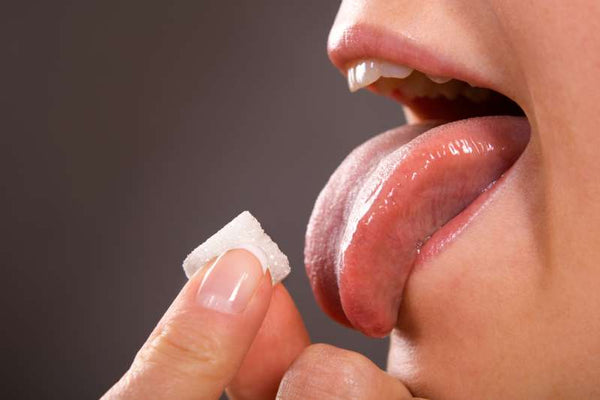You will experience a sweet taste in your mouth if you eat candy or drink soda. However, if you often have this taste in your mouth without consuming sweet foods, you may be concerned about this condition. Having a particularly heightened sense of taste is known as dysgeusia. Although many people complain of a bitter or sour taste in their mouth, the abnormal taste sensation can cause a sweet taste in the mouth. This permanent sweet taste in your mouth can be caused by a number of medical reasons. For example, diabetes, medications or a bacterial infection are causes of sweet taste in the mouth. However, a permanent sweet taste in your mouth is a sign that you have a more serious disease and therefore have poor oral health. You should therefore consult your dentist as soon as possible. He or she will advise you on the most appropriate treatment for your problem.
Here is a guide that will help you understand how to get rid of the sweet taste in your mouth.
Having a sweet taste in the mouth: what is it?
Dysgeusia is considered as an alteration of taste, which can be temporary or permanent. The sense of taste is not always diminished, but the tastes experienced are modified and often unpleasant. They no longer correspond to the taste usually felt for a type of food.
The different causes of a sweet taste in the mouth
A sweet taste in the mouth can be linked to cancer. However, there are other causes.
Here are the different causes of a sweet taste in the mouth:
Diabetes
If you have diabetes, it means that the insulin in the body is affecting the blood sugar levels on a large scale. This therefore leads to high blood sugar levels to avoid the repetition of sugar in the blood. In some cases, it causes a constant sweet taste in the mouth. It is therefore important to properly control your blood sugar levels to avoid complications of diabetes.
Neurological problems
Damaged sensory taste nerves can leave you with a constant sweet taste in your mouth. For example, if you have had a stroke or seizure, your sense of taste will be heightened or impaired. Strokes also cause dysfunction of the sense of smell and taste. Some people lose the ability to detect all tastes except sweet in the mouth. This can have a negative impact on quality of life and lead to nutritional problems.
Bacterial Infections
A bacterial infection of the upper respiratory tract will leave a sweet taste in your mouth. They can interfere with the way your brain reacts to sweet, bitter, sour and salty tastes. If you've had a cold, flu or sinus infection, you may find that you have that taste in your mouth until the infection goes away.
A low-carbohydrate diet
Many people who follow a low-carbohydrate diet report that they develop a consistent fruity, sweet taste in their mouth. Low-carb diets have helped many people lose weight quickly and naturally. The function of carbohydrates in the body is to provide a fuel source. A diet that limits carbohydrates will therefore have a positive effect on insulin levels, reduce cravings and boost metabolism.
Tips to calm the sweet taste
Here are some tips to help you calm the sweet taste in your mouth.
Good oral hygiene
You must remember to brush your teeth at least twice a day, remembering to clean the spaces between your teeth with dental floss, and also brush your tongue. Finally, use a mouthwash solution after brushing your teeth at least twice a day.
Eating healthy foods
It is important to consume foods such as citrus fruits, which activate saliva, and to avoid fried and spicy foods, carbonated drinks, processed fruit juices, coffee and alcohol. These are foods that interfere with your taste.
Drink enough
Water at the right temperature is an excellent remedy to eliminate toxins in the mouth and to reduce the acids in the stomach responsible for the bitter taste in the mouth. Therefore, do not forget to consume 1L5 of water per day.
You can use the Y-Brush dental floss. It is a dental floss with an ecological handle, made of biosourced and biodegradable vegetable plastic! PLA (polyactic acid) is derived from renewable resources such as corn or sugar cane. It allows to clean efficiently and delicately between each tooth and is very easy to use thanks to its handle. The thread is easily inserted in the interstices and interdental spaces, and does not damage the gums.
Solutions for loss of sweetness
Treatment options for taste alteration or loss depend on the exact cause of the dysgeusia (taste disorder) or hypogea. If mineral or vitamin deficiencies are present, multiple or specific vitamin supplements (B12, B-complex and zinc) may be helpful. If due to medication, switching to another medication may help restore a normal sense of taste. Management of other conditions that may trigger taste disturbance, such as diabetes, thyroid disorders or kidney problems, may also lead to improvement.
The need to reduce or stop smoking or other forms of tobacco use, as well as managing acid reflux with medication or dietary changes, cannot be overemphasized. Drinking plenty of water can also help with dry mouth due to Sjogren's syndrome, radiation therapy or age-related taste loss.
We hope this guide has helped you understand what it is to have a sweet taste in your mouth and what causes it. We also hope that you will have understood the tips that can be used to calm the sweet taste in the mouth and the solutions to stop having a sweet taste in the mouth.


